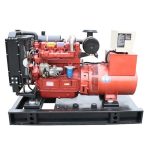Introduction
Diesel generators are essential components of power generation systems, offering reliable and efficient backup power in case of grid failures or as a primary power source in remote locations. In 400kW generator safety tips , there has been an increasing focus on synchronizing diesel generators with the grid to enhance overall system efficiency and reliability. This article explores the benefits and considerations of using diesel generators for synchronization with the grid.
Overview of Diesel Generators
Diesel generators are power generation units that utilize diesel fuel to produce electricity. They consist of an engine that runs on diesel fuel and a generator that converts the mechanical energy from the engine into electrical energy. Diesel generators are commonly used in various applications, including industrial facilities, commercial buildings, data centers, and residential properties.
One of the key advantages of diesel generators is their reliability and durability. Diesel engines are known for their robust construction and long lifespan, making diesel generators a popular choice for standby power applications. Diesel fuel is also widely available and relatively inexpensive compared to other fuel sources, making diesel generators a cost-effective option for power generation.
Benefits of Synchronization with the Grid
Synchronizing diesel generators with the grid offers several benefits, both for the generator owner and the utility company. One of the primary advantages of grid synchronization is the ability to sell excess power back to the grid, allowing generator owners to offset their operating costs and even generate additional revenue. This can be especially beneficial for owners of large-scale power generation facilities that produce surplus electricity.
Grid synchronization also enables diesel generators to operate more efficiently and cost-effectively. By synchronizing with the grid, generators can adjust their output based on the grid's demand, helping to maintain a stable and reliable power supply. This can lead to fuel savings and reduced operating costs for generator owners, as well as improved overall system efficiency.
In addition, grid synchronization can enhance the reliability and resilience of the power system. By integrating diesel generators with the grid, utilities can better manage peak demand periods and mitigate the impact of grid disturbances or outages. Diesel generators can provide backup power during emergencies or grid failures, ensuring continuity of service for critical facilities and operations.
Considerations for Grid Synchronization
While there are many benefits to synchronizing diesel generators with the grid, there are also several considerations that need to be taken into account to ensure a successful integration. One of the key considerations is the need for proper synchronization equipment and controls to ensure the seamless operation of the generators with the grid.
Synchronization equipment, such as synchronizing relays and controllers, is essential for maintaining the proper frequency and voltage levels when connecting diesel generators to the grid. These devices help to synchronize the output of the generators with the grid's electrical parameters, ensuring a smooth and stable connection. It is important to select high-quality synchronization equipment that is compatible with the specific requirements of the grid and the generators.

Another important consideration is the need for proper protection and safety measures when synchronizing diesel generators with the grid. In the event of a grid disturbance or fault, generators must be able to disconnect quickly and safely to prevent damage to the equipment and ensure the safety of personnel. Proper protection devices, such as circuit breakers and relays, should be installed to detect and isolate faults promptly.
Furthermore, it is essential to consider the impact of grid synchronization on the overall power quality and stability of the system. Diesel generators can introduce harmonics and voltage fluctuations when connected to the grid, which can affect the performance of sensitive equipment and devices. Proper filtering and power conditioning equipment should be installed to mitigate these issues and ensure a high level of power quality.
Conclusion
Diesel generators play a vital role in power generation systems, offering reliable backup power and primary power generation capabilities. Synchronizing diesel generators with the grid can provide numerous benefits, including increased efficiency, cost savings, and enhanced system reliability. However, successful grid synchronization requires careful consideration of various factors, such as synchronization equipment, protection measures, and power quality considerations.
By addressing these considerations and implementing appropriate control and protection systems, diesel generator owners can leverage the advantages of grid synchronization to optimize their power generation operations and contribute to a more resilient and reliable grid infrastructure. As the demand for clean and reliable power continues to grow, the integration of diesel generators with the grid will play an essential role in meeting the evolving needs of modern power systems.
